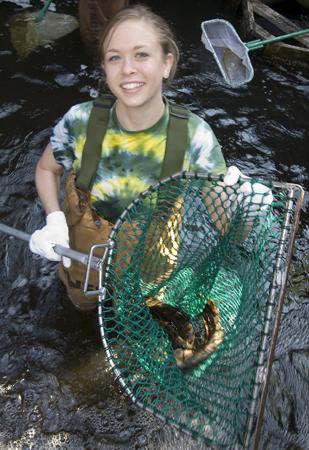SURF project: Lamprey Gonadotropin – Releasing Hormone Analogs and Inhibition of Steroidogenesis in Male Petromyzonmarinus (Sea Lamprey)
IROP project: Evolutionary Studies of the Neuropeptide Y System in Vertebrates

The results of Caryn MacDonald’s research into hormones might be tricky to grasp. But the starting point is simpler—and also a lot more slippery. MacDonald, a molecular biology major, is studying hormones in sea lampreys. Step one: She and other students in Professor Stacia Sower’s lab trek down to the Cocheco River in Dover, N.H., to catch the slimy, sucker-mouthed fish during their wiggly migration from the ocean.
“At first, I thought they looked like sea monsters from some horror movie,” says MacDonald, who dons heavy cotton gloves to better grasp the fish, which look something like eels. “But once you get used to it, it’s not too bad.”
It turns out that sea lampreys are ideal for studying hormones. They are among the most primitive (basal) of vertebrates, and their hormone systems share similarities with those in higher vertebrates, including humans. Plus, they’re easy to catch with a dip net.
“Hormones are interesting, because almost every process that goes on in your body is somehow controlled by hormones,” says MacDonald, who grew up in Dover. Her work is supported by grants from the National Science Foundation and the National Institutes of Health, through the UNH Center for Molecular and Comparative Endocrinology, directed by Professor Sower. MacDonald was awarded a Summer Undergraduate Research Fellowship (SURF) in 2008 to study reproductive hormones in male lampreys, and an International Research Opportunities Program (IROP) grant in 2009 to continue this research in Sweden. Someday, her work may lead to a better understanding of hormone regulation in humans.
It’s advanced research for an undergraduate, but MacDonald says her professors and the Hamel Center for Undergraduate Research helped with encouragement, technical assistance, and financial resources. “I’m so glad I’m able to do all this,” MacDonald says. “It means that instead of getting a summer job scooping ice cream or something, I’ll get the chance to study a field I really want to pursue in the long run.”
—Jim Graham